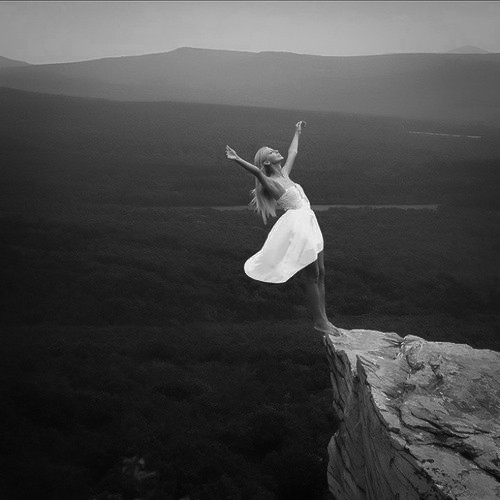
Where I am from, there are no mountains, cliffs or skyscrapers. Yet, I have been drawn to heights my entire life.
Ever since I was a child, I felt the strange desire to be high above the ground. Countless times I climbed the tallest trees in the garden, the roof of my parents house- only to realize it was merely a child?s notion to test bravery, to see how easy it was to do something irreversible and absurd. And, no- I did not want to die. I was terribly afraid of heights. I still am. So what is this perilous curiosity that to this day draws me upwards?
Not long ago, people would not have even dreamed about climbing mountains. The heights were out of our reach- holy places only to be revered from below. Life had enough dangers, without seeking out more risk, more ways to die.
?To those who are enthralled by mountains their wander is beyond all despite. To those are not their allure is a madness.?
At height you can be taken right to the brink ; yet I never feel so alive when I am up there, knowing that at any minute I could die. Safety and danger, height, fear, the siren song of old Freudian death wish: these are the elements that always jostle in my mind as I reach summits.
I am not suicidal. I find heights exhilarating. And yet, the mental slideshow of the jump, of the fall, is too vivid. This impulse. This picture. Where does it come from?
It?s comforting to know that somewhere, someone has figured out a term for that feeling you think you shouldn?t have. There is a chance you?re not crazy after all. Or at least, not alone.
It?s a phenomenon that has emerged over and over again in language, art, and psychology around the world.
The 19th-century philosopher Soren Kierkegaard wrote about it in his book -The Concept of Anxiety. ?He whose eye happens to look down into the yawning abyss becomes dizzy. But what is the reason for this? It is just as much in his own eyes and in the abyss? Hence, anxiety is the dizziness of freedom,? he wrote.
A group of psychologists at Florida State University discovered that ?High Place Phenomenon? (HPP) was not uncommon. Rather than a sign of suicidal ideation, it may be the mind?s convoluted way of appreciating life. ?An urge to jump affirms the urge to live?.
Dr. Yeates Conwell, co-director of the Center for the Study and Prevention of Suicide at the University of Rochester Medical Center, also referred to the HPP in a recent interview: ? It makes perfect sense. The thoughts that might seem scary or unusual actually are fairly common and don?t necessarily indicate any pathology or real risk??
The French call it: l?appel du vide. The call of the void. It?s quite lyrical and perhaps more accurate, than HPP, because it doesn?t just happen atop of cliffs, buildings and mountaintops. Standing on a train platform as the train pulls in, inflicts the same horror battle: the urge to jump, and desire to live.
It?s appalling to realize that there is nothing to stop you from jumping, except the command of your own body and mental state. And who can trust that? Living in a country with the highest safety standards in the world, we often find ourselves surrounded by warning signs and safety caches and redundancies.
Could this be the reason why we seek out danger? We court it, and pay for it on occasion. Because sometimes heights slip our grip, and there is no glory for those left behind. In small form, the thrill of it is exhilarating. In full form it annihilates, turning the strange force that draws us up into headlong pursuit of peril.
Mostly, I?m not trying to exercise my ability to throw myself off things; it?s done for me. Which make those situations where it?s possible to self-distract all the more palpable.
Big brands and online views have as much to do with it as some quest of the human spirit. The industry of the extreme sports is flourishing on the human yearning for risk and adventure. The business of jumping out of helicopters or cycling off cliffs is at least partly that: business. An opportunity for an ordinary person to be briefly extraordinary has turned into a multi-billion dollar industry of ascend.
Ironically, having found a perfectly coiled explanation for what I have always known as madness, brings very little contentment. There are still moments, when standing on an edge of something, I feel waves of thrill and terror wash over my body; and I couldn?t help but think that I am just a fool- half mad and half in love with oblivion, looking for a quick escape.


